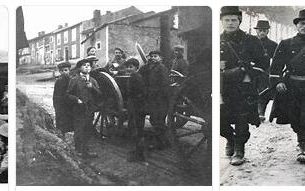Kosovo – Independent since February 17, 2008
Kosovo is one of two former autonomous provinces in the Yugoslav republic of Serbia. Yugoslavia consisted of six largely autonomous republics (Slovenia, Croatia, Bosnia, Macedonia and Serbia) and as part of the republic of Serbia were: in the south the autonomous province of Kosovo and Metochien and in the north the autonomous province of Vojvodina. With an amendment to the Yugoslav constitution in 1974, the previously existing autonomy rights were considerably expanded, and the previously autonomous area became an autonomous province within Serbia. The autonomy was abolished in 1989 as part of the so-called anti-bureaucratic revolution at the instigation of Slobodan Milosovic by a resolution of the Serbian parliament.
The first clashes in Kosovo took place on April 1, 1981, barely eleven months after Tito’s death. On the night of April 1 to April 2, 1981, around 5,000 militiamen of the special unit moved from Belgrade to Kosovo to “defend the integrity of Yugoslavia”. Militia units from other cities in Serbia also joined them on the way. As a result, Kosovo was already in a war-like state on February 2nd. And even then, the attacks on the peaceful and in no way rebellious civilian population took place. But since Yugoslavia was a more or less stable state at that time, the world did not want to interfere in the domestic political disputes.
At the end of the 1990s there was a massive struggle for independence by the Albanians in Kosovo, which was answered with a renewed, intensive deployment of the Serbs. The situation culminated in attacks against the Albanian population and finally in ethnic cleansing. After NATO air strikes, KFOR troops occupied the area. Under international law, Kosovo was still part of Serbia until February 17, 2008, but it was largely self-governing. The government was officially under the control of the United Nations until then. She was responsible for finance, agriculture, the environment, communication and health. The United Nations, on the other hand, had control over external relations, the security apparatus and the judiciary. On 17
The new constitution was signed in Prishtina on June 15, 2008 by President Fatmir Sejdiu.
On June 22, 2010, the International Court of Justice of the UN in The Hague presented an opinion – it was not a judgment – in which it stated that Kosovo’s unilaterally declared independence would not violate international law.
On September 10, 2012, Kosovo finally became a fully sovereign state after its independence.
The first agreement with Sebia was reached in April 2013, whereby the Serbian minority in the north of the country was given extensive independence
| Name of the country | Kosovo |
| Form of government | Independent since 1999 under administrative sovereignty of the United Nations (UNMIK) since February 17th, 2008, on June 15th, 2008 the constitution was signed by the President |
| Head of state | President Fatmir Sejdiu (since February 17, 2008) |
| Geographical location | Southeast Europe |
| National anthem | “Europa” was officially played for the first time on June 15, 2009 |
| Population | approx. 1.8 million (Credit: Countryaah: Kosovo Population) |
| Ethnicities | approx. 91% Albanians, approx. 4% Serbs and Montenegrins and approx. 5% others (Turks, Bosniaks, Gorani, Roma) |
| Religions | predominantly Muslims, alongside Orthodox, Catholics and other Christian communities |
| Languages | Albanian and Serbian are the official national languages, occasionally English and German |
| Capital | Pristina |
| Surface | 10,887 km² |
| Highest mountain | Gjeravica with a height of 2,656 m. |
| Longest river | Drini i Bardhe with a length of around 122 km. |
| Largest lake | Gazivode with an area of about 9.1 km² |
| International license plate | KM |
| National currency | Euro |
| Time difference to CET | = CET |
| International phone code | 00381 |
| Mains voltage, frequency | 230 volts, 50 hertz |
| Internet Top Level Domain (TLD) | not yet taken |
Kosovo: history
Before the year 1000
In the 4th century BC Illyrian tribes united to form a kingdom in what is now the area around Kosovo. Confrontations with the Greeks, Macedonians and Celtic tribes were frequent. In 33 BC The kingdom became a Roman province. Visigoths invaded the area at the end of the 4th century, and Huns and Ostrogoths in the 5th century.
According to Abbreviationfinder website, Slavs invaded the area in the 6th and 7th centuries. Serbian tribes settled there permanently and in 830 the Serbian state of Raska was established. From 976 the area was under the Eastern Roman Empire (Byzantium).
From the year 1000 to the 17th century
In 1180 Serbia and Kosovo became independent from Byzantium. In 1346 Tsar Dusan was crowned Tsar of Serbs, Greeks, Bulgarians and Albanians. In the 14th century the Ottomans advanced north. On June 15, 1389, the legendary battle on the Amselfeld took place. There, Serbian troops suffered a crushing defeat against the Ottoman army, despite the support of Albanians, Croats, Bulgarians and Wallachians. This marked the beginning of the Ottoman rule in the area, which lasted until 1912.
In the 18th and 19th centuries
From 1830 the Albanian interest in a nation state began. It was formed in the “League of Prizren”, which called for the self-government of the areas populated by Albanians and the introduction of Albanian as the official and administrative language. With the emerging weakness of the Ottoman Empire, the idea of the nation state spread among the Albanian population. However, she found no support from abroad. In 1878 the “Berlin Congress” began to reorganize the territorial situation in the Balkans. The Albanian interests were not taken into account. Parts of the area populated by Albanians were assigned to the Christian countries of Serbia and Montenegro. The Albanian population subsequently rallied to prevent the cession to Montenegro, which nevertheless took place in 1880. In 1881 the Albanians formed a provisional government and placed Kosovo, including the Albanian areas in Macedonia today, under the “League”. However, this was smashed by Turkish troops in the same year. In 1885 the Albanians tried again in vain to assert their interests.
In the 20th and 21st centuries
In 1912 an Albanian national congress again proclaimed the independence of Albania and formed a provisional government, which was not recognized by foreign countries. At an ambassadors conference in London in 1913 it was decided to establish a principality in Albania. The first prince was the German Prince Wilhelm zu Wied, who had to leave the country after six months when the First World War broke out. Furthermore, the boundaries of the Albanian settlement area were determined at the conference, which resulted in the area being divided. Kosovo fell to Serbia. A fateful development began. The Kosovar Albanians no longer enjoyed minority rights. The official language became Serbian and Serbs and Montenegrins settled in the area. The Muslim population was supposed to be expelled to Turkey or Albania. Militant Albanian resistance against Serbia developed in the 1920s.
After the capitulation of Yugoslavia in 1941, Kosovo was divided into an Italian, a German and a Bulgarian occupation zone. Italy united the zone with the Albania they ruled. After the Italian surrender in 1943, German troops moved into the Italian occupied territory of Albania. An Albanian resistance to the German occupation followed. The Kosovar Albanians hoped for an Albania that included Kosovo.
After the end of the Second World War, Kosovo was placed under Yugoslav military administration. Numerous Albanians were executed. Kosovo was reconnected to Serbia and the Albanian population continued to suffer under foreign rule.
It was not until 1963 that Kosovo was granted its first rights of autonomy. After numerous demonstrations, it was declared the “Socialist Autonomous Province of Kosovo” in 1969. In 1974, however, it was again almost on a par with the other republics of Yugoslavia.
In 1980 mass demonstrations again raised calls for a Republic of Kosovo. Instead, Slobodan Milosevic revoked the country’s autonomous status in 1989. There were professional bans and arrests of the Albanian population.
In 1990 the Albanian parliament proclaimed the “Republic of Kosova”. However, Serbia dissolved the parliament and the government again. In 1991 there was a referendum for independence. In 1992 a president was elected. However, Serbia declared the practice illegal and the international community also refused recognition. In 1998 the clashes with the Serbian security forces escalated. The Albanians increasingly joined the KLA. A peace conference in France in 1999 tried to find a peaceful way. The attempts failed, however, because Serbia refused. The Serbian troop deployment in Kosovo was intensified and there were massive attacks against the civilian population. Ethnic cleansing began.
On March 24, 1999, NATO began air strikes against military targets across Yugoslavia.
The Serbs’ response was to expel the Albanian population from Kosovo. Over a million people were affected.
After an agreement with the Yugoslav leadership and the adoption of a UN resolution, the air strikes were ended on June 10, 1999. Two days later, KFOR troops occupied Kosovo. Under international law, Kosovo belongs to Serbia and Montenegro, but it is self-governing. The UN interim administration, the UNMIK (United Nations Interim Administration Mission in Kosovo) is located in Prishtina. Parliamentary elections were held for the first time in 2001. In 2002 Ibrahim Rugova was elected the first President of Kosovo. The government remains under the control of the United Nations. She is responsible for finance, agriculture, the environment, communication and health. The United Nations retains control over external relations, the security apparatus and the judiciary.
On February 17, 2008 the parliament of Kosovo declared the country’s independence. The country’s new constitution was signed by the president in Prishtina on June 15, 2005. On the same day, the new national anthem “Europe” was officially played in the city. The hymn has no lyrics.
On September 10, 2012, Kosovo finally became a fully sovereign state after its independence. The first agreement with Sebia was reached in April 2013, whereby the Serbian minority in the north of the country was given extensive independence.



